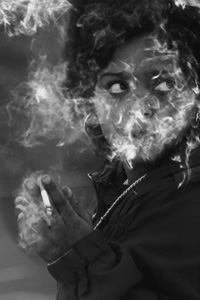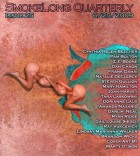Great story! Tell us a bit about the idea for this piece. Have you written other “funny” pieces?
Hey, is it okay if I indicate when I’m laughing, even though this is a typewritten interview? It is? Okay. (Laughs) Um, this is a piece about unrequited love, of course, something everyone is familiar with. But it’s also about living in a community of close friends who all know each other’s business. I’m proud to call myself a part of such a community—mostly the friends I went to grad school with, but others too, who are familiar with each other’s work and personal details because you can’t know one without knowing the other. This story evolved from similar ones we’ve made up about each other through the years.
I don’t like to write anything that I don’t get a private chuckle out of. A lot of my work has a “funny” bent (good call using the quotes, by the way), especially in the dialogue: people making cruel jokes about each other, speaking in trendy idioms, or just yelling. I find all these things delightful.
— And I’ll go, ‘So? Darling? I’m doing a book too! Don’t you think I’m doing a book? We are ALL doing books!” — This made me smile. So, are you, Amanda, doing a book?
Well, kind of. I’m doing a lot of different things that all want to be books, but I don’t know which one is most likely to make it. I would love for all my short stories and cartoons and DJ patter to come together somehow, someday, and hopefully that won’t have to wait until the TV movie they make about me after I die in some weird scandal. It would be nice to see all that stuff in a book instead, during my lifetime, wouldn’t it? I realize this might be a good opportunity to choose a cool-sounding project to pitch. (Laughs) In case it isn’t too late for that, one thing I’m working on is a book of 30 very short personal essays, like one or two pages each, accompanied by illustrations.
I really like how you end this flash. What made you use this as the end line?
When I was writing this the whole drama—or, rather, melodrama—dropped into my head very fast. I think that last line might have been the first one I thought of and then I worked backwards from it. This woman has the entire story of a non-love affair scripted out, and the reader has to believe that yes, it will happen this way. But once she considers the actual love, she has no idea what to make of that… because you never know what falling in love will entail until you do it. So I’ve heard.
You’re also a DJ. How often does music show up in your writing?
All the damn time. (Laughs) My friend Summer Pierre, who illustrated this piece, has said that using music as a reference point is a slippery slope because no one song means exactly the same thing to everyone, and also because you risk alienating whoever has never even heard of that song. But I come down on the other side of that argument: I think that by referencing something that fits a certain niche, you can touch a lot of people who understand what that song’s about, or didn’t know that they did—or you can get them to go out and listen to it if they don’t know it. Often I’ll mention a song and then stick the lyrics in, have a character hear or sing them. That probably means I’m a better DJ than I am a writer. (Sighs)
And you draw cartoons. Ever considered making this story into a cartoon?
What, it isn’t perfect the way it is? (Laughs) People ask me this a lot about my fiction—whether I’d consider converting it to pictorial form. But my drawings are different tonally from my fiction; they’re either completely autobiographical or kind of zany and absurd. Definitely more R. Crumb than Adrian Tomine, and, you know, not actually good like either of those. To answer the question, though: no for this particular story. For some other story later on, maybe. I do have some stories that I’ve crudely illustrated, sort of Vonnegut-style, but Vonnegut already did that so I feel weird about it.


